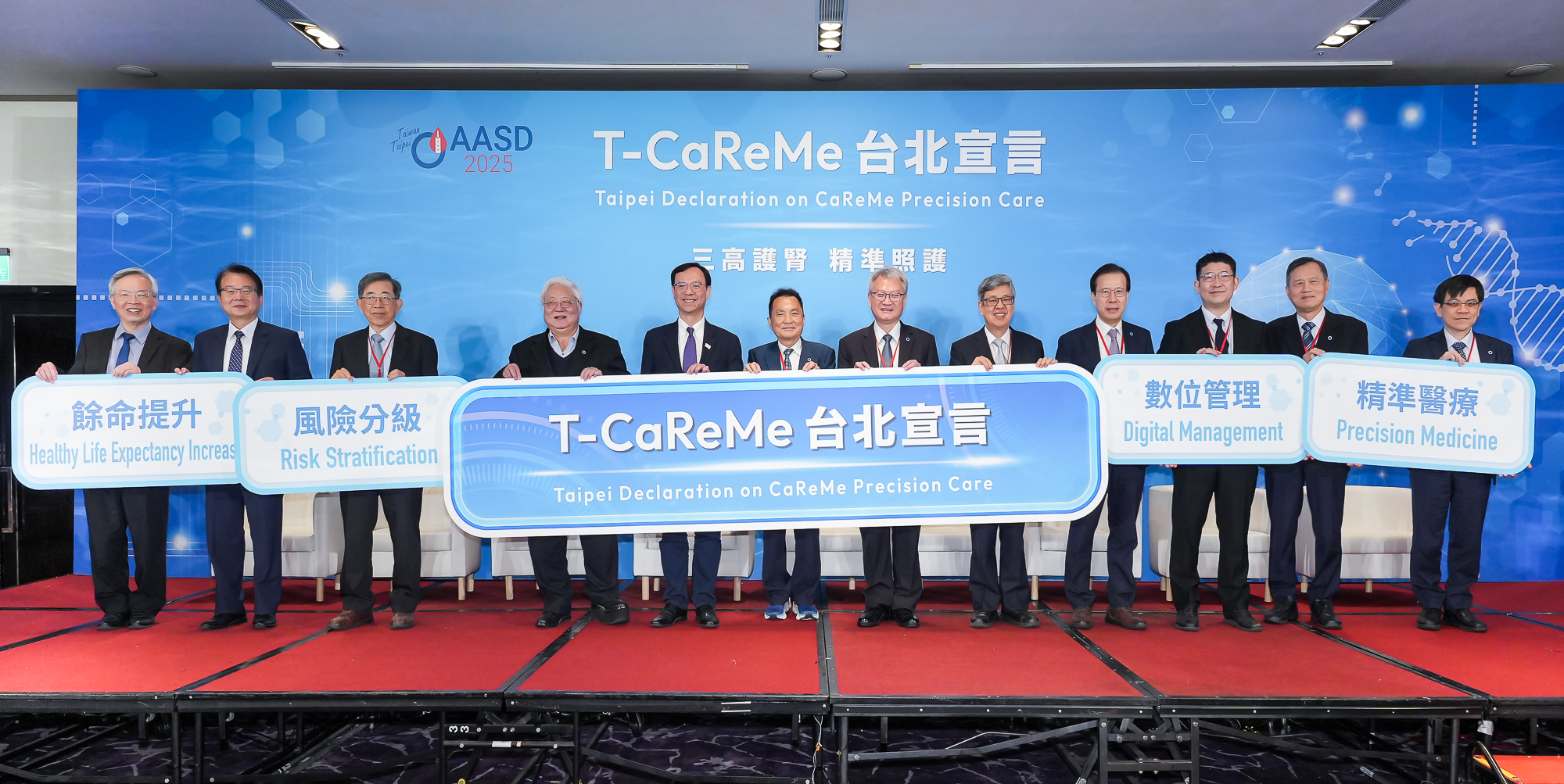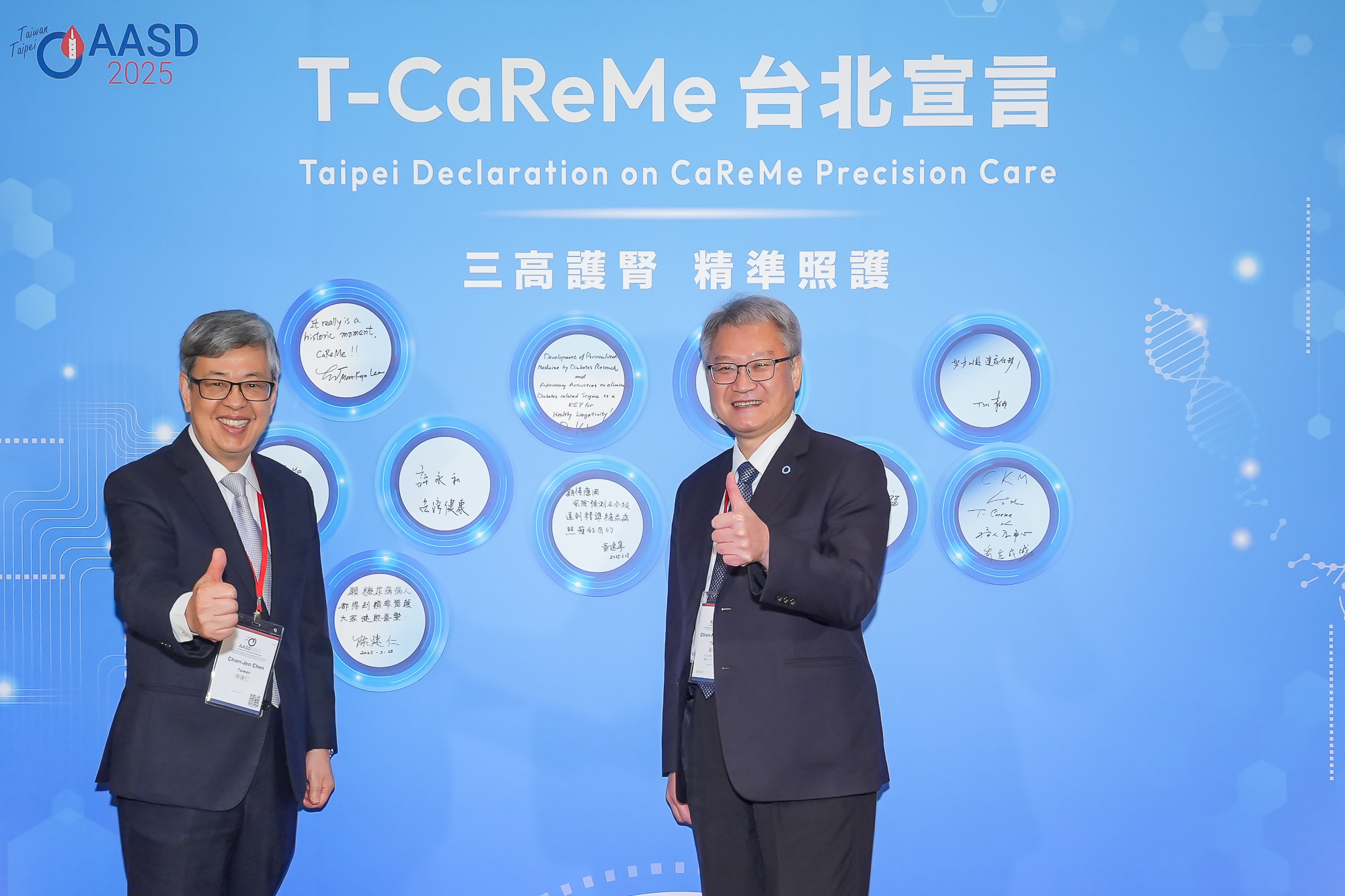Media OutReach
Diabetes Association Unveils T-CaReMe Taipei Declaration at the Asia Diabetes International Conference

In an effort to achieve a target of 80% of patients controlling the three highs and protecting kidney health within eight years, Taiwan leads the international trend of precise prevention with public-private collaboration in response to the new health goals of Healthy Taiwan.
TAIPEI, TAIWAN – Media OutReach Newswire – 28 March 2025 – As the global aging process accelerates, the prevention and care of chronic diseases have become a top priority for countries worldwide. The Taiwanese government has actively responded to international trends by promoting the “Healthy Taiwan” policy and launching the “Three Highs Prevention 888 Plan.” At the third “Healthy Taiwan Promotion Committee” meeting held last month, new goals were announced to reduce the standardized mortality rate of chronic diseases related to the three highs by one-third by 2030, aiming to strengthen chronic disease prevention and control measures through public-private collaboration. In alignment with the vision of “Healthy Taiwan” and the 888 Plan, and connecting with the international trend of “precision prevention” of chronic disease management, the Taiwan Diabetes Association formally presented the “T-CaReMe Precision Care Taipei Declaration” at the Asia Diabetes International Conference.
With a comprehensive national health insurance system in place, Taiwan ensures that every high-risk group can receive proactive prevention and personalized management early on, demonstrating international competitiveness in the accessibility and completeness of chronic disease care. To address the increasingly severe challenge of chronic diseases—particularly hypertension, hyperlipidemia, diabetes (the three highs), and chronic kidney disease—the Taiwan Diabetes Association unveiled the “T-CaReMe Precision Care Taipei Declaration” at the 17th Scientific Meeting of the Asian Association for the Study of Diabetes (AASD). This declaration was made in witness of various governmental agencies, academic institutions, and medical associations, including the Asian Association for the Study of Diabetes, the National Health Insurance Administration, the Health Promotion Administration, Academia Sinica, the National Health Research Institutes, the Taiwan Society of Nephrology, and the Taiwan Society of Cardiology. The declaration responds to the government’s vision of “Healthy Taiwan” and the goals of the 888 Plan, which focus on delaying disability and increasing life expectancy. It proposes a comprehensive health care model for chronic diseases centered around risk stratification, precision medicine, and digital management, further promoting the integration of holistic health care and medical services, while fostering interdisciplinary collaboration to drive a new paradigm of chronic disease prevention and treatment.

New Health Goals for Healthy Taiwan: Reduce Standardized Mortality Rate of Chronic Diseases Related to the Three Highs by One-Third
The Taiwan Diabetes Association Unveils T-CaReMe Declaration to Promote Precision Care Blueprint for Kidney Health in Relation to the Three Highs
With the trends of aging, prolonged illness, and the emergence of chronic diseases at younger ages, chronic disease prevention and management have become a global focus. Taiwan is following international trends by establishing the “Healthy Taiwan Promotion Committee,” which has set two major health goals for the next eight years: to increase the average life expectancy of the population from 79 to 82 years and to reduce the proportion of unhealthy life expectancy from 10% to 8%. To strengthen chronic disease management, the government recently announced a target at the Healthy Taiwan Promotion Committee meeting to “reduce the standardized mortality rate of chronic diseases related to the three highs by one-third by 2030,” along with comprehensive strategies promoting healthy lifestyles, obesity prevention, and holistic management of chronic diseases, through public-private collaboration to enhance health policies and reduce the risks of chronic diseases and disabilities.
The Taiwan Diabetes Association has released the “T-CaReMe Precision Care Taipei Declaration,” making “Kidney Protection in Relation to the Three Highs” a core focus. Through the T-CaReMe initiative, the vision of “risk stratification, precision medicine, digital management, and increased life expectancy” is implemented, along with five key action frameworks: promoting precise risk diagnostics, standardized clinical guidelines, personalized health management, data sharing, and interdisciplinary collaboration. The goal is to ensure that 80% of patients with the three highs and kidney disease achieve control of blood glucose, blood pressure, and blood lipids while ensuring that 80% of kidney disease patients receive care and medication guidance from care managers, thereby enhancing survival rates and improving health quality, creating a stronger defense for chronic disease care in the population.
Risk Stratification × Precision Medicine: T-CaReMe Initiative Launches a New Future for Chronic Disease Management
International Experts Gather to Establish Taiwan as a Demonstration Base for Chronic Disease Care
The T-CaReMe Taipei Declaration focuses on precise risk diagnostic classification and assessment, aiming to accurately identify high-risk populations and improve the effectiveness of chronic disease management. Through expert consensus and clinical risk stratification, as well as medical guidelines, the initiative integrates clinical data with international standards to ensure that patients receive personalized health management and appropriate treatment. Additionally, the declaration emphasizes collaboration across nations and disciplines, engaging in precision medicine and research achievements in the realm of chronic diseases in the Asia-Pacific region, influencing public health policies and improving chronic disease care outcomes, while developing a more precise and accessible holistic health care approach, solidifying Taiwan’s position as a regional demonstration base.
The meeting brought together experts and scholars from the National Health Insurance Administration, the Health Promotion Administration, Academia Sinica, and the National Health Research Institutes, along with representatives from the International Diabetes Federation (IDF-WPR) and the Asian Association for the Study of Diabetes (AASD), to witness the official launch of the “T-CaReMe Precision Care Taipei Declaration.” The Taiwan Diabetes Association stated that the declaration not only lays the groundwork for Taiwan’s development blueprint in precision chronic disease care and kidney health management related to the three highs but also aims to promote upgrades in chronic disease management models, enhance interdisciplinary collaboration, and build a more comprehensive health care system, driving improvements in global chronic disease care quality and prosperity starting from Taiwan.
Dr. Wu Mai-Su, President of the Taiwan Society of Nephrology, noted that although Taiwan has developed risk stratification and data-driven personalized treatment, standardized guidelines have yet to be incorporated, and clinical applications still have room for improvement, especially in the integrated management of kidney disease and diabetes. He expressed that through the T-CaReMe initiative, interdisciplinary collaboration can facilitate the integration of chronic kidney disease risk and comorbid management with diabetes and hypertension, contributing to higher patient survival rates and better kidney function maintenance. Dr. Li Yi-Heng, President of the Taiwan Society of Cardiology, emphasized that risk stratification and data-driven personalized management can effectively reduce the incidence of cardiovascular events, further strengthening the health defenses of the population. Dr. Hsu Hui-Heng, Deputy Director of the National Health Research Institutes, stated that the application of precision medicine will play a crucial role in future chronic disease management. The National Health Research Institutes is actively exploring several initiatives, such as using AI technology and big data to establish smart risk prediction systems, believing that under the visionary actions of the T-CaReMe initiative, there will be further optimization of precise predictions for cardiovascular, kidney, and metabolic disease risks, providing better scientific bases for the prevention of primary and secondary complications and organ damage associated with chronic diseases, thus realizing Taiwan’s health blueprint.
Aligning with International Standards! T-CaReMe Initiative Promotes a New Paradigm of Precision Chronic Disease Management
Taiwan will construct a comorbidity risk database within two years. The T-CaReMe initiative calls on all sectors to build a defense against chronic diseases.
In recent years, the Health Promotion Administration has actively promoted the “Scientific Disease Calculation Center” and risk prediction tools to enhance public health literacy and self-management awareness, delaying the onset of chronic diseases through proactive health education. Meanwhile, the National Health Insurance Administration has introduced AI risk stratification tools and a tiered care system, promoting the “Everyone’s Health Platform” and comprehensive, patient-centered care to improve care efficiency and resource utilization. Professor Chen Chih-Hong, Vice Convener of the Healthy Taiwan Promotion Committee, stated that the T-CaReMe initiative aligns closely with government policies integrating prevention and treatment, reflecting the core spirit advocated by the 888 Plan. In the future, it is hoped that all sectors will work together to deepen interdisciplinary collaboration and public-private integration, creating a sustainable and resilient model for chronic disease care.
The global healthcare community has identified precise risk assessment and personalized treatment as key trends in chronic disease management. The latest diabetes care guidelines particularly address the comorbidity risks associated with the three highs and kidney disease, suggesting earlier intervention in cardiovascular and kidney health management and enhancing data-driven diagnostic models. The importance of early screening and treatment is emphasized, and precise risk assessment and integration of patient data will be core development directions for future chronic disease management. These international trends indicate that global chronic disease management is moving towards precision medicine, digital monitoring, and interdisciplinary integration, which aligns closely with the goals of the T-CaReMe initiative.
The Taiwan Diabetes Association took action as early as 2023, collaborating with 12 medical institutions in Taiwan to join the iCaReMe global registry program. Through interdisciplinary integrated care, patient tracking, and the application of clinical data, it not only provides more precise risk assessments and patient profiles but also effectively monitors and optimizes treatment outcomes, which has been shown to improve patients’ health conditions. Chairman Huang Jian-Ning shared that the short-term goal of the T-CaReMe initiative is to construct a representative database within two years. By analyzing lifestyle factors, it aims to more accurately assess the comorbidity risks of different patients. Implementing a comprehensive model for precision chronic disease care requires not only efforts from the medical community but also active participation from government agencies, academic institutions, industry partners, and civic groups to jointly promote data integration and personalized health management, ensuring that risk stratification and standardized guidelines are continually refined, while enhancing chronic disease management effectiveness in Taiwan and the Asia-Pacific region.
Yutaka Seino, Chair of the Asian Association for the Study of Diabetes conference, stated that Taiwan has consistently been at the forefront of chronic disease prevention and treatment in Asia, and he hopes that through public-private collaboration and interdisciplinary cooperation, Taiwan can lead the global improvement of chronic disease care quality.
Hashtag: #DiabetesAssociation
The issuer is solely responsible for the content of this announcement.
Media OutReach
St. George’s University Prepares Future South Korean Physicians for the Growing Global Cancer Care Challenge
Recognizing the importance of addressing workforce shortage in South Korea, St. George’s University (SGU) School of Medicine in Grenada, West Indies, highlights how its medical education approach supports the development of clinical competencies relevant to cancer care across healthcare settings.
These challenges reflect broader global trends, where cancer care increasingly depends on multidisciplinary teams rather than specialty expansion alone. SGU’s curriculum is designed to build a strong foundation in clinical diagnosis, patient communication and multidisciplinary care, which are essential skills for effective oncology and cancer-related care. Through anatomy labs, simulation-based learning, and integrated digital tools, students develop foundational clinical skills in structured, supervised environments designed to reflect real-world medical practice.
The curriculum also integrates traditional cadaveric dissection with modern 3D anatomical modeling. This blend helps students visualize the human body in a holistic way while reinforcing knowledge through their hands-on interaction. SGU’s simulation lab also enables medical students to have their first direct interaction with ill patients in a safe, simulated learning environment.
On top of core medical training, SGU offers early exposure to prevention, diagnosis and patient-centered care to prepare graduates to tackle complex health issues. SGU has developed long-standing relationships with more than 75 established hospitals and clinical centers in the US and UK. These clinical placements provide exposure to diverse patient populations and care environments, including settings where cancer diagnosis and management are part of routine clinical practice.
South Korean SGU alumni are contributing to healthcare systems through roles that intersect with cancer diagnosis, treatment coordination, and long-term patient care. For example, Dr. Julia Hweyryoung Cho, MD 2022 is practicing internal medicine, which plays a crucial role in cancer care. Internal medicine physicians are often involved in the initial diagnosis of cancer, managing complex medical conditions that may arise during treatment and providing long-term comprehensive care and survivorship planning for patients with a history of cancer.
In observance of World Cancer Day 2026, SGU encourages all medical professionals and organizations to collaboratively address global cancer care challenges. This includes recognizing and meeting the cancer healthcare needs of individuals and communities in South Korea.
For more information on the programs and tracks available through SGU School of Medicine, visit SGU’s website.Hashtag: #St.George’sUniversity
The issuer is solely responsible for the content of this announcement.
Media OutReach
Finalists and Semifinalists for $1 Million Seeding The Future Global Food System Challenge Announced
Created and funded by Seeding The Future Foundation and, for the first time, hosted by Welthungerhilfe (WHH), the Challenge attracted a record 1,600+ applications from innovator teams in 112 countries, underscoring growing global momentum for food systems transformation.
Following a multi-stage, rigorous international review process, 36 teams have advanced across three award levels. These include 16 Seed Grant Finalists (competing for 8 awards of USD 25,000), 12 Growth Grant Semifinalists (competing for 3 awards of USD 100,000), and 8 Seeding The Future Grand Prize Semifinalists (competing for 2 awards of USD 250,000).
“Hosting the GFSC reflects Welthungerhilfe’s commitment to accelerating bold, scalable innovations where they are needed most. This year’s diversity of solutions underscores the complexity of food system challenges and the creativity of innovators worldwide.” said Jan Kever, Head of Innovation at Welthungerhilfe
The submitted innovations span diverse themes and approaches, including climate-smart production, nutrient-dense foods, food loss reduction, and inclusive market models, reflecting the complexity and interconnected nature of today’s food systems challenges.
“The Seeding The Future Global Food System Challenge exists to catalyze impactful, bold, and scalable innovations that advance food systems transformation. We are excited to work alongside Welthungerhilfe as a trusted partner and host of the Challenge and are encouraged by the quality and diversity of innovations emerging from this first year of collaboration.” said Bernhard van Lengerich, Founder and CEO of Seeding The Future Foundation
While the number of awards is limited, all semifinalists and finalist applicants plus all applicants with any prior recognition of other innovation competitions can join the STF Global Food System Innovation Database and Network—currently in beta testing with the Food and Agriculture Organization of the United Nations—vastly expanding their visibility and reach across a global audience.
List of 2025 GFSC Seed Grant Finalists, Growth Grant and Seeding The Future Grand Prize Semifinalists
Find details here: welthungerhilfe.org/gfsc-finalists
Seeding The Future Grand Prize Semi-Finalists
- CNF Global, Kenya
- ZTN Technology PLC, Ethiopia
- One Acre Fund, Rwanda
- Sanku, Tanzania
- Nabahya Food Institute (NFI), Democratic Republic of the Congo
- ABALOBI, South Africa
- metaBIX Biotech, Uruguay
- Nurture Posterity International, Uganda
Growth Grant Semi-Finalists
- Baobaby, Togo
- Safi International Technologies Inc., Canada
- Centro Internacional de Mejoramiento de Maíz y Trigo (CIMMYT), Mexico
- Farmlab Yeranda Agrisolution Producer Company Limited, India
- Banco de Alimentos Santa Fe (BASFE), Argentina
- Chartered Consilorum (Pty) Ltd, South Africa
- American University of Beirut, Environment and Sustainable Development Unit (ESDU at AUB), Lebanon
- The Source Plus, Kenya
- Iviani Farm Limited, Kenya
- Rwandese Endogenous Development Association, Rwanda
- NatureLEAD, Madagascar
- Ndaloh Heritage Organisation, Kenya
Seed Grant Finalists
- Inua Damsite CBO, Kenya
- World Neighbors, United States
- Keloks Technologies Ltd, Nigeria
- REBUS Albania, Albania
- Tanzania Conservation and Community Empowerment Initiative (TACCEI), Tanzania
- Intrasect, Switzerland
- VKS AGRITECH, India
- Murmushi People’s Development Foundation, Nigeria
- Levo International, Inc., United States
- Effective Altruism Research Services Ltd, Uganda
- Taita Taveta University, Kenya
- CultivaHub, Democratic Republic of the Congo
- Resource Hub for Development (RHD), Kenya
- FUTURALGA S.COOP.AND, Spain
- West Africa Centre for Crop Improvement, University of Ghana, Ghana
- Sustainable Solutions Kenya, Kenya
Hashtag: #TheFutureGlobalFoodSystemChallenge
The issuer is solely responsible for the content of this announcement.
About Seeding The Future Foundation
STF is a private nonprofit dedicated to ensuring equitable access to safe, nutritious, affordable, and trusted food. It supports innovations that transform food systems and benefit both people and planet. More at Seeding the future.
About Welthungerhilfe
WHH is one of Germany’s largest private aid organizations, striving for a world without hunger since 1962. More at: Welthungerhilfe (WHH)
Media OutReach
PolyU develops novel antibody targeting fat cell protein, offering new approach to treating metabolism-related liver cancer

Metabolic dysfunction-associated steatotic liver disease (MASLD), commonly known as fatty liver disease, currently affects around a quarter of the global population and is an important risk factor for liver cancer. In affected individuals, fat cells induce insulin resistance and chronic inflammation, leading to excessive fat accumulation in the liver. This ultimately impairs liver function and may progress to liver cancer. Treatment options for MASLD-induced liver cancer remain limited and the effectiveness of current immunotherapies is suboptimal.
A breakthrough study led by Prof. Terence LEE, Associate Head and Professor of the PolyU Department of Applied Biology and Chemical Technology, and his research team has revealed that an adipocyte-derived protein, known as fatty acid-binding protein 4 (FABP4) is a key driver that accelerates tumour growth. Through mass spectrometry, the team confirmed that patients with MASLD-induced liver cancer had markedly elevated FABP4 levels in their serum. Further investigations showed that FABP4 activates a series of pro-proliferative signalling pathways within cells, causing cancer cells to multiply and grow more rapidly.
Prof. Lee’s team has successfully developed a monoclonal antibody that neutralises FABP4. This antibody not only inhibits the growth and proliferation of FABP4-driven cancer stem cells, but also enhances the ability of immune cells to combat cancer.
Prof. Lee said, “This neutralising antibody against FABP4 demonstrates significant potential in inhibiting tumour growth and activating immune cells, providing a complementary approach to current immunotherapy strategies. Our findings highlight that targeting adipocyte-derived FABP4 holds promise for treating MASLD-induced liver cancer.”
Prof. Lee added that gaining deeper insights into how adipocyte-derived FABP4 affects liver cancer cells helps to explicate the disease mechanisms of liver cancer, particularly in obese individuals. Intervening in the relevant signalling pathways could provide effective methods to combat this aggressive malignancy.
Prof. Lee believes that, as this adipocyte-targeted immunotherapy continues to mature, it will bring more treatment options to MASLD patients. He remarked, “If its efficacy can be proven in clinical trials, it could offer new hope to many affected individuals.”
The research is supported by the Innovation and Technology Fund of the Innovation and Technology Commission of the Government of the Hong Kong Special Administrative Region of the People’s Republic of China. PolyU has filed a non-provisional patent for the developed antibody and is continuing to optimise its binding affinity to facilitate future clinical applications.
Hashtag: #PolyU #FattyLiver #Cancer #LiverCancer #理大 #香港理工大学 #肝癌 #癌症 #脂肪肝
The issuer is solely responsible for the content of this announcement.
-

 Feature/OPED6 years ago
Feature/OPED6 years agoDavos was Different this year
-
Travel/Tourism9 years ago
Lagos Seals Western Lodge Hotel In Ikorodu
-

 Showbiz3 years ago
Showbiz3 years agoEstranged Lover Releases Videos of Empress Njamah Bathing
-

 Banking8 years ago
Banking8 years agoSort Codes of GTBank Branches in Nigeria
-

 Economy3 years ago
Economy3 years agoSubsidy Removal: CNG at N130 Per Litre Cheaper Than Petrol—IPMAN
-

 Banking3 years ago
Banking3 years agoSort Codes of UBA Branches in Nigeria
-

 Banking3 years ago
Banking3 years agoFirst Bank Announces Planned Downtime
-

 Sports3 years ago
Sports3 years agoHighest Paid Nigerian Footballer – How Much Do Nigerian Footballers Earn











